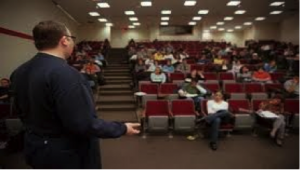Did you know that, almost every class missed by a student is a pre-planned decision rather than an instant decision? I was a little surprised to learn this when I interviewed some of my friends who are American freshman at UConn. After I finished my research (interviews), I totally agree with Nathan “Ditching class was a minor time-saving (or week shaping) strategy” (121). Missing classes is a strategy used by almost every student in order to maintain balance between their academic life, non-academic (sports, clubs, fraternity, etc.) and their personal life.

One of my friends told me that he didn’t usually go to his bio class because he thought reading his textbook instead of going to class was more helpful, rather than listening to professor’s own views or listening to his personal opinion. I interviewed two bio majors and both of them said that they didn’t go or hardly went to their bio class, reason being that professor wasn’t that much of a help and that it was an early class. But then I interviewed three engineering majors, they usually have three important classes related to their major and the other two classes was general education classes. They take their classes related to their major very seriously and do whatever is necessary to do their homework and when it comes to the general education classes, they just want a high GPA, they don’t care if they like the subject of the class of not, they did care about their personal choice, but it wasn’t enough to make them take a class of their liking over a class where they could get a higher GPA.
A few days back we had to pick our classes and when I asked for suggestions regarding the general education classes, everyone suggested a class because it was an easy A or there wasn’t much work to do. They preferred an online class since it could be done at any time of the week at one’s will and wish, students even suggested me to take late classes and gave me a website named “koofers.com” which had information about the easiest classes at any university, the professor’s easiness, past quizzes and tests, basically a guide to pick easy classes. This is so similar to Rebekah Nathan’s observation “A definite theme that emerged in these student-to-student recommendations was an affirmation of “easy” courses and easy A’s”, but since the book was written many years ago they had to rely on their seniors or experienced undergraduates to pick classes, whereas now all we have to do is go to a website and all the information needed to pick easy classes would be there.
I was amused to know that when one of my friends missed a class, they never or very rarely asked one of their friends about what was taught in class. But in some classes the professors put up their lecture slides online just after a lecture and sometimes my friends would just have a look if they have missed the class, well a few minutes of PowerPoint can’t teach you was taught in an hour long class. On asking whether the weather had any effect, on their decision to go to class they said that it didn’t matter. A few of my friends said that they would miss more early classes, if only they weren’t freshman.
If attendance was part of the grade for a particular subject, all of my friends said that they would think twice before skipping a class, and that they would only miss that class if they had any graded work for another subject. If midterms were approaching then everyone I interviewed said, that they would definitely go to that particular class which had a midterm that week. Before an exam there is a review session which is on the day before the exam and I have seen that the whole lecture hall was almost full which means that almost ninety nine percent of the class was there so that they could listen to the review session assuming that the reviewed questions would appear on the exam, just like this review session there is a post review session that talks about the solutions to the exam, only a few people had attended this post-review session, the number of people attended was less than four percent of the class which was very less compared to the ninety nine percent of the class.


We can see by this that students mostly care about their GPA rather than just gaining knowledge. One of my friends doesn’t go to almost half his classes every week and says that he’s better off studying on his own rather than going and listening to the professor, but never misses the review session, which ironically is conducted by the same professor.
On asking them that was there anything the university’s administration could do so that students attended their classes more, majority said that that if they didn’t want to go to a class, the university should do nothing and respect their decision. One of my friends had an interesting idea that a university could take off a couple of a hundred dollars from a student’s tuition if they attended all of their classes. “if I want to miss a class, let me.”, that was what a person I interviewed had to say. After seeing students attitude towards classes, it is true that students go to college to learn more than what it taught in class, they want to develop skills which you can’t develop by reading a book like people skills which can only be developed by interacting with different people. Even though students miss their classes, and pick easy classes, it does not mean that they are neglecting college, but are learning stuff that can’t be taught, like how to manage your time and mainly how to create a balance to how to manage one’s time. After this research, I have learned that missing classes is a student’s strategy to managing his or her time, and that college is not only about attending classes, it’s about making connections, doing internships, building relationships, improving people skills, which can only be learned by going to college and can’t be learned by reading a book. –Nihar, English 1003, Fall 2013
***
Nathan discussed her observations of “academically speaking” in chapter 5. “The time before and after classes…it was a time for academic and social small talk, including stories about the recent weekend, the ‘fun’ things that were done, or how tired or “wasted” the speaker was at the moment”(pg.96). As a large public university, many UConn students follow this pattern as well. For over a week, I have paid extra attention to conversations around me in before various classes; most of the people who happened to sit around me happened to discuss about exams and assignments frequently. “How is your review going for the exam next week,” “did you do the homework which due today”, or “the quiz was way tooooo hard”, were the three common phrases used in most conversations I overheard. Other than academics, people also like to talk about their relationships, parties, sports, and gossips. None of them seemed to care or talk about the knowledge they are about to learn from the lecture. From those topics students discuss before class, they reveal that most students in UConn tend to put their focus on whatever is necessary to earn a good grade and fun events around their own lives, not what they really learn from the lectures.
From my personal experience, when I was choosing classes for my first semester as a freshman, upperclassmen whom I knew from clubs recommended classes like “linguistics, [since] it’s an easy A” after I have chosen a difficult science course. They have also recommended “professors [who are] nice,” and told me to “take [their] classes” as these professors are generally friendly and helpful. Like what Nathan writes on the book, these upperclassmen acted like “the mature, thoughtful student needs to know the ‘easy As’ so [they] can supplement a schedule that already contains heavy course loads or demanding classes” (pg.115). These upperclassmen balance their social and academic life well so that they do not stress themselves too much.
In addition to the advice I had received earlier this year, I have also interviewed 10 students whether it is better to enroll in a class I am interested but I will do poorly, or an easy A that covers the material I am not interested in. The result suggests that most interviewees prefer to take the easy class. According to one of the students whom I have asked, “I would choose the easy one to retain my GPA for now, and take the one I’m interested in when I’m a senior or pass/fail scheme.” Only one student prefers to take the harder class, says that “she would be sad if she does poorly on that class, but she would definitely choose the class she is interested in.” In order to dig deeper into the academic culture in UConn, I asked them if they think GPA is the most important thing in college life, I got some interesting answers from it. One student said “GPA is like money, it’s something great to have, but it doesn’t always prove something about you. It’s like a representation of the potential that you might be able to achieve.” Furthermore, I found out the most important factor in college also depends on the major one is in. One of my interviewees said that “GPA is not that important for me because finding a job in my major field, passing all those required exams and retain the GPA above 3.3 is enough for me to find a decent job.” Basically, according to the interviewees, one’s GPA and college diploma only serves as an indicator for companies to predict one’s potential and a tool for students to find a job in the future; some students would take the easy classes to retain their GPA and impress the companies they are interested in instead of what they really want to learn.
When I go to the Linguistics class, the easy class which upperclassmen recommended, I found out the average attendance of that class is about two thirds of its maximum capacity, some students wear earphones to watch videos, Facebook, or text their friends during the class. When the professor asks a question in class, rarely anyone volunteers to answer it. The professor uploads the lecture materials and review guides online for the students’ convenience, as an aid for studying and understanding the material. Some students takes advantage of it and started skipping classes. One of my American friends, who had also enrolled in the course but in a different time slot, told me that she has not been to the class since after the first exam; she studied for the upcoming exams just by going through the power point slides and still got an A on the second exam. Technology, in this case, did not necessarily helped the process of learning, instead, it provided an alternative solution of potentially scoring well without actually going to class and absorbing the knowledge.
According to Nathan’s research regarding attendances, out “of the seventy-seven people in my section who responded anonymously, 90 percent, I found out later, reported that they came to 95-100 percent of the classes; only one person claimed to attend 55-74 percent of the classes, and none admitted attending fewer than 50 percent.” (pg.120) I got a different result than Nathan’s. Of 10 students I interviewed, 4 of them came to 95-100 percent of the classes, and 4 of them came to 75-94 percent of the classes while the other 2 attend 51-74 percent of the classes. Same as Nathan’s, no one admitted attending fewer than 50 percent. Most of classes they skip are general education classes, which they think they can handle even if they don’t go the classes. Some claimed that the classes happened to take place during the lunch time, so they prefer to have lunch instead of going to class. Only 2 people, who attend 51-74 percent of the classes, skip their major classes. One of them claimed that he “doesn’t trust the professor” so he always studies on his own and only goes to the class right before the exam to ensure he understands the material covered in the exam. The other one states the reason that he skips the class often is due to the fact that the class is too early for him to wake up, which is at 9:30 am.
According to Nathan, “Don’t take early classes,” is defined as “anything before 11 A.M”. “Don’t take classes on Friday. Don’t take any class with an unknown professor” (pg.113). These “‘native rules’ for formulating the perfect class schedule” are basically true among students. Out of those 10 students I have interviewed, all of them prefer to avoid morning, lunch-time and Friday classes, and register for a known professor class if possible. Some would even use online tools or websites such as “ratemyprofessor.com” to ensure that they are avoiding the bad and tough professors. Those “native rules” among students, in my opinion, are actually the leading factors that made students increasingly lazy and reduce their motivation to study. And this culture is slowly spreading into the whole society. People will become progressively spoiled generation after generation if these rules kept on being adopted by students. People will eventually lose the curiosity towards knowledge, and nothing is going to be improved in the future if every student views study as a burden and studies passively. –Qing Peng, English 1003, Fall 2013